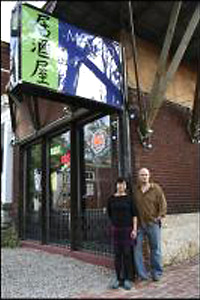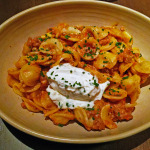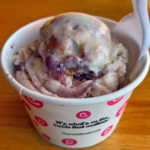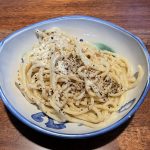 |
| Maido Essential Japanese is Louisville’s only example of “izakaya” dining, a combination of pub, sake bar and eatery. Pictured are owners Jim and Toki Masubuchi Huie. LEO Photo by Nicole Pullen. |
LEO’s Eat ‘n’ Blog with Louisville HotBytes
(Maido Essential Japanese)
Here’s a dining critic’s dilemma: I live in Crescent Hill, so I drive past Maido Essential Japanese often. Every time I do, I look over and feel a warm, loving feeling pass over me as I think, “I love that place.” Yet, because duty calls me to dine somewhere different every week, I rarely get to come back to Maido and other favorites … and that’s just wrong.
So it was to my great delight that I turned over a calendar page the other day and saw that enough time had passed since Maido’s 2004 opening to justify a return trip. Hai!
Maido, it should be noted, is Japanese, but it is not just another sushi bar. In fact, it’s not a sushi bar at all, although sushi is made in the kitchen. It’s something much more interesting: Louisville’s only example (and one of the few between the coasts) of “izakaya” dining, a combination of pub, sake bar and eatery that’s beloved by “sararimen” (“salary-men” or business workers) in Japan’s second city, Osaka, and the Kansai region around it.
The izayaka specializes in small dishes, affordably priced, with the idea that a couple or a group can select a variety of contrasting bites to accompany with plenty of libations. Think Spanish tapas, with an Asian spin.
The word “Maido,” pronounced “My dough” and literally translated “every time,” comes across in Osaka slang, depending on formality, as something like “‘sup?” or “I look forward to doing business with you.”
Maido is a quintessential Clifton spot, an old shotgun house that’s been utterly transformed with a Techno-Japan accent. Bold, spare avocado green walls sport contrasting spots of burgundy and a mirror across the back, with funky art and funky music and funky tattoos on the servers’ arms. An old-fashioned wooden bar dominates a black-and-white-tiled small room up front. Maybe a dozen simple gray marble-look tables fill the smallish dining room; they’re simply furnished with pairs of single-use ohashi chopsticks and little jars of soy sauce. Green plastic patio tables and chairs under bright yellow umbrellas make the shady, gravel-paved patio a popular spot, weather permitting.
The lengthy menu allows a thoughtful choice between enjoying a light selection or two and a drink – maybe an artisan sake – and getting out for a budget price; or doing as we did and covering the table top with an impressive collection of small plates, filling up, and still getting out for a toll that’s more than fair by Frankfort Avenue standards.
Choosing from said menu is always an adventure. You’ll find a few traditional Japanese restaurant standards, but I usually steer clear, figuring that I can get gyoza potstickers at any Japanese place. Ditto fried oysters. I come here for something different … ahhh! Tako-yaki! Octopus fritters! I remember them from a street festival we ran across in Tokyo one day: ultimate, X-treme Japanese street food. Needless to say, Maido has it.
We ordered some, and a whole bunch more. A total of six small plates for two to share. That should be enough, but … can’t we have just one sushi? Puh-leeze? Oh, all right.
So we begin with an imposing maki-zushi (sushi “roll”), dubbed Ambrosia ($11), served on a long, free-form gray plate with the standard pale-green wasabi horseradish and tangy pink pickled ginger in a corner. A full-length cylinder of sticky rice was draped in pretty pink and white strips of raw tuna, mild and silken smooth, rolled around bits of sweet white scallop and rich green avocado and sliced into eight bite-size rounds. The flavors and textures went together beautifully. OK, it’s not a sushi bar, but Chef Toki still makes remarkable sushi. It would be marginally silly to dine here and not have some.
I’ve been meaning to try sake at Maido for a long time. It’s the city’s best sake bar, with a good choice of about 10 different Japanese and American sakes; and next time I return, I might just do that. But when I looked over the thoughtfully chosen beer list, I knew we had to go with fermented malt and hops rather than fermented rice. Kirin Ichiban ($4), a popular import in cans but rare on draft, and Bell’s Oberon wheat beer ($4), a summer specialty happily still on tap on a warm October night, both hit the spot. (Maido’s wine list is admirable, too, short but well-chosen and affordable, most of its dozen selections hailing from south of the Equator.)
From this point on, we spent a delightful evening going full-bore izayaka, and the hits just kept on coming.
Yu-Tofu ($6.50) arrived in an attractive black bowl that fit neatly over a flame to keep it warm. It bore a half-dozen cubes of snow-white, silky tofu, nearly an inch square; plenty of Chinese cabbage cut in squares and a couple of carrot flowers, with a chunk of konbu kelp – yes, it’s seaweed, OK? – that turned the simmering water into a light, subtle vegetable broth that gave the tofu a subtly delicate flavor. Dipping the cubes in a spicy soy-based dipping sauce and finely chopped scallions and ginger kicked them up like a karate yudan’s foot thrust.
Chicken Karaage ($5.50) consisted of a half-dozen good-size chunks of boneless chicken, tender and deeply flavored from marinating in a sake and soy mix that imparts a delicate fruity flavor. They were crisply breaded and deep-fried with a toothy, chunky coating that reminded me of traditional down-home fried chicken livers.
The aforementioned Tako-Yaki ($5) is Maido’s answer to the Louisville rolled oyster. Five spheres about the size of ping-pong balls each contained a chunk of chewy, mild-flavored octopus within a ball of grilled wheat cake scented with ginger and scallion. They’re drizzled with the thick, sweet brown sauce that’s usually summoned to dress deep-fried tonkatsu pork cutlets.
Eggplant with miso sauce ($5) came in a small, deep bowl containing tender bite-size cubes of creamy cooked eggplant bathed in a sweet-savory miso sauce that blended seductive brown-sugar and fruit flavors with just a hint of piquant heat.
Kimchi pork ($6.50) brought a touch of Korean flavor to the table. Thin-sliced, bite-size pieces of pork and squares of fiery kimchi cabbage were stir-fried together until the spicy kimchi sauce permeated the pork and painted it deep red. The flavors were great, but we thought it would be even better with a bowl of steaming white rice, which didn’t come with the meal but arrived promptly upon our request.
Wasabi salmon ($8) looked more traditionally Western than the other plates, albeit with an Asian sensibility. A fair-size slab of salmon steak was placed on a lavender plate coated with a white cream and artful stripes of pale-green wasabi. The flavors were beautiful, highlighting and complementing the tender if rather light salmon.
We thought we were full, but the call of green tea ice cream ($3.50) was difficult to resist, so we succumbed to a shared bowl of lovely, pale-green cream with a subtle tea-and-cream flavor that’s only slightly sweet.
A memorable, delicious and downright happy dining experience seemed entirely fair at a $66.78 toll, and helpful, on-the-spot service earned a $14.22 tip.
Maido Essential Japanese
1758 Frankfort Ave.
894-8775
www.maidosakebar.com
Robin Garr’s rating: 92 points



